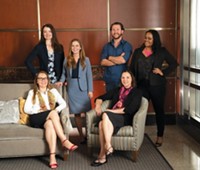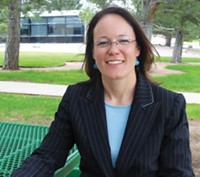Advertisement
Grab your lab coat. Let's get started
Welcome!
Welcome!
Create an account below to get 6 C&EN articles per month, receive newsletters and more - all free.
It seems this is your first time logging in online. Please enter the following information to continue.
As an ACS member you automatically get access to this site. All we need is few more details to create your reading experience.
Not you? Sign in with a different account.
Not you? Sign in with a different account.
ERROR 1
ERROR 1
ERROR 2
ERROR 2
ERROR 2
ERROR 2
ERROR 2
Password and Confirm password must match.
If you have an ACS member number, please enter it here so we can link this account to your membership. (optional)
ERROR 2
ACS values your privacy. By submitting your information, you are gaining access to C&EN and subscribing to our weekly newsletter. We use the information you provide to make your reading experience better, and we will never sell your data to third party members.
Environment
Margaret E. Kosal
Chemist applies her science and entrepreneurial know-how to solve real-world security problems
by LOIS EMBER
December 13, 2004
| A version of this story appeared in
Volume 82, Issue 50
Margaret E. Kosal has packed a lot into 31 years. She holds a Ph.D. in inorganic chemistry from the University of Illinois, Urbana-Champaign, where she invented a new family of catalytically active organic zeolites. On the way to a postdoc position in France, she made a U-turn: With her research adviser Kenneth S. Suslick and two others, she founded in 2000 a high-tech sensor development company called ChemSensing.
At ChemSensing, Kosal worked on sensors to detect chemical and biological agents and explosives, especially landmines. Over time, she says, she "became more interested in the application of detectors in the real world" than in developing them in a laboratory. "I've always been interested in politics, and I'm an international treaty junkie," so "how detectors were being used or could be used" became more intriguing to her.
Upon returning to ChemSensing from four weeks of trekking in the Himalayan Mountains of Nepal--her first vacation in many years--Kosal reached another fork in the road. After some introspection, she decided to leave the company in 2003 and to use her science background to solve technologically based security problems. Or, as she describes it: "At ChemSensing, I worked on finding ways to take cutting-edge science and make it applicable to real-world situations. Now I'm taking real situations and trying to figure out where the science fits in."
She has since pursued what she calls technical security problems, first as a postdoctoral fellow and adjunct professor at the Monterey Institute of International Studies, and now as a science fellow at Stanford University's Center for International Security & Cooperation. At both institutions, she has concentrated on what she calls "the intersection between emerging science and domestic and international policy issues."
Her special focus has been on biotechnology and nanotechnology--technological innovations that increasingly are being incorporated in threat assessments. She has homed in on analyses that anticipate the threats from nanotechnology. There are, she says, two potential threats: the creation of a nanotechnological arms race within traditional state-based weapons programs and the risk of nonstate actors--terrorists--using nanotechnology for malicious purposes. And terrorists, she notes, "are not just radical Islamists but may also be deranged or cash-strapped scientists."
When she's not thinking and writing about security issues, she's busy skydiving--she's made about 1,000 jumps--and mountain climbing--she's climbed 12 of Colorado's 14,000-foot peaks. She makes metal/stone jewelry and has been active in communities wherever she's lived.
As a student in Champaign-Urbana, Ill., she ran a Sunday soup kitchen at the Catholic Workers' House and volunteered with the local Girl Scouts. In Monterey, Calif., she was active in the Women's International League for Peace & Freedom, a United Nations-recognized nongovernmental organization, and now does technical consulting for that group's national headquarters in New York City.
Both in Illinois and now in the San Francisco Bay Area, Kosal has been involved in local Independent Media Centers as an editor for their monthly newspapers and as a writer on international science and security issues.

Given her adventurous and activist nature, it's not surprising that she would volunteer to go to Iraq to help Iraqi scientists catch up with scientific developments they had missed over the decades of Saddam Hussein's rule. Kosal heard about the Iraq Summer Faculty Development seminars from the dean of Monterey Institute's International Policy School and was accepted as the only physical scientist among 15 U.S. scientists participating.
Kosal says she "was attracted to the program because I wanted to be an American civilian seen as being proactive in rebuilding a civil society in Iraq and because Iraqi scientists were asked what they wanted to know and learn about." She was asked to teach "nanotechnology as applied to alternative energy production, particularly photovoltaics."
The three-week program--which was to be held this summer--is funded by the Lounsberry Foundation and administered by the Institute of International Education (IIE), which also administers the Fulbright Fellowships for the State Department. Even though the program was to take place at the University of Sulaymania in the relatively quiet Kurdish area, instability in the country and fear for participants' safety prompted IIE to cancel the program this year. However, IIE Program Officer Melissa Deschamps says her institute "hopes to be able to get the seminar program going after Iraq holds elections in January." And Kosal plans to be involved.
Kosal has published research on proliferation and terrorist risks of biotechnology and nanotechnology and has written a chapter on the public's response to chemical weapons destruction for a book to be published in January by the United Nations University Press and the Organization for the Prohibition of Chemical Weapons (OPCW). She is now researching industry-targeted terrorist incidents to develop a risk assessment from the angle of motivation rather than vulnerability.
Her position as science fellow at Stanford expires in July 2005. Although she was successful as a bench chemist and still enjoys coming up with research projects after reading scientific journals, she doesn't expect to return to experimental chemistry.
Kosal is aiming for an academic position in technical security studies in a department "truly interested in doing interdisciplinary, multidisciplinary work." But, she says, her ideal next step "would be an inspector's position with the OPCW," the group that implements the chemical weapons treaty.







Join the conversation
Contact the reporter
Submit a Letter to the Editor for publication
Engage with us on Twitter